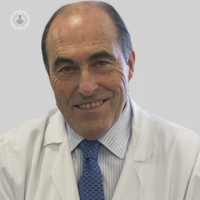Stenosis in 3rd and 4th age
Written by:Dr. Ruiz- Ocana is Head of Department of Neurosurgery, University Hospital Chiron Madrid and President of the Spanish Society of Neurosurgery.
¿'s canal stenosis
?I think the first thing is to explain what the spinal canal. Call spinal canal to canal located throughout the column and form the vertebrae to articulate with each other on all the medial axis of the column. By this conduit or channel down the cord from the base of the skull until the last vertebrae. Is also important to know that emerge from the spinal cord to the right side panel, left, and the nerves transmit sensation and will make possible the movement of muscles after a cerebral, voluntary or reflex order.
Stenosis refers to the loss of the diameter of the spinal canal or holes through which the nerves out, being created a conflict of space between container and content. Ie neural elements are compressed with little blood supply. The most common area is the lumbar region affectation.
¿What these patients have symptoms
?Basically patients complain of pain or tingling sensation in the legs after having walked a distance that will vary between 50 and 150 meters according to the degree of pathology presenting. Many of these patients have to sit and rest in order to start up again. There is usually no pain at rest.
Other symptom is pain that radiates in the form of sciatica in one or both legs even without having moved off and only stand. Sometimes there is a combination of these symptoms.
¿happens at 3ªand 4ªage
Over the years the joints of the vertebrae degenerate and form bony ridges that contribute to narrowing of the canal. Furthermore thickening an existing ligament between the vertebrae which also reduces the diameters produced. As the average human life is prolonged, this pathology is more common in the consultations.
¿solution exists ?¿That surgery has risks
?The solution is basically decompressive surgery. There is no risk of neurological sequelae and the good results achieved 80%. Is the risk of the patient general pathology such as hypertension, diabetes, cardiac disorders or taking anticoagulants frequent at this age that the surgery itself.




